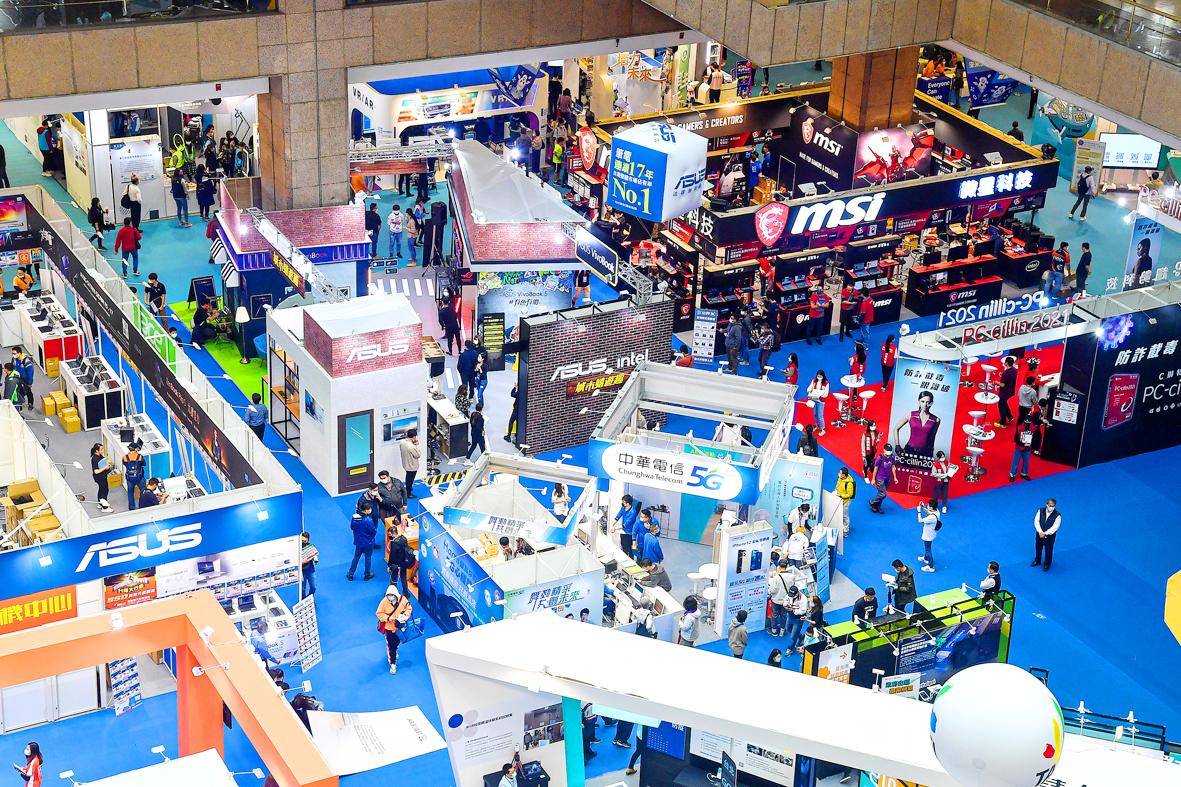Taiwan’s technology sector, in particular the semiconductor industry, is expected to remain a key driver of its economic growth next year, DBS Bank Ltd said in a report last week.
However, tech companies would still be pressured to shift sensitive production out of China and further diversify their supply chains as the US-China technology dispute takes root, the bank said.
Strong technology exports boosted the nation’s GDP, which expanded by a better-than-expected 3.92 percent year-on-year last quarter, the most since the second quarter of 2015. That prompted the Directorate-General of Budget, Accounting and Statistics (DGBAS) on Nov. 27 to adjust upward its full-year growth forecast to 2.54 percent from 1.56 percent.

Photo: CNA
The DGBAS predicted exports might remain strong this quarter and grow 7.75 percent year-on-year on the back of strong demand for new technology applications, but DBS said that global demand for computers and consumer electronics is expected to decline next year, as “the one-off purchases related to remote work and distance learning” driven by the COVID-19 pandemic dissipate.
However, demand for cloud services, data centers and 5G applications would likely continue to increase next year, as many countries build digital infrastructure and push digital transformation after the pandemic, DBS said.
In addition, smartphone demand is poised to recover next year as global income conditions improve and more consumers upgrade their smartphones as 5G networks expand, it said.
“Overall, the outlook for semiconductor demand remains constructive,” DBS economist Ma Tieying (馬鐵英) said in the report.
Taiwan has managed to maintain positive GDP growth this year despite the pandemic, which DBS forecast would expand 1.8 percent this year and 4.2 percent next year, citing the government’s early and effective response to the outbreak, as well as the tech sector’s strong performance.
Given the mild inflation outlook and the strong New Taiwan dollar, the central bank is expected to hold its policy interest rate steady at 1.125 percent through next year, as pressure to normalize rates would remain low in the near term, DBS said.
However, the potential impact of the US’ transition in leadership is worth watching, and there could be some tactical adjustments in US-China trade issues as multilateralism regains US support under US president-elect Joe Biden’s administration, the bank said.
Even though US-China trade tensions might improve under Biden’s presidency, the two countries’ tech sector rivalry would continue next year, DBS said, citing bipartisan concerns in the US about national security risks resulting from China’s advances in 5G, artificial intelligence and other new technologies.
Moreover, the COVID-19 has also caused companies to weigh the risks of geopolitical tensions among countries and diversify their supply chains, with some firms shifting their manufacturing base out of China to other Asian countries such as India, Vietnam and Thailand.
“To Taiwan, the trade disruption risk as a result of [the] China-US trade war may decrease in 2021. But pressure would remain for the Taiwanese tech companies to diversify their supply chains to hedge the risk of China-US tech tensions,” Ma said.
“In addition, [the] leadership transition in the US creates some uncertainties for the outlook of a bilateral free-trade agreement (FTA) between Taiwan and the US. The focus of Taiwan’s FTA talks may shift towards multilateral agreements like the CPTPP [Comprehensive and Progressive Agreement for Trans-Pacific Partnership] going forward,” she added.

The US dollar was trading at NT$29.7 at 10am today on the Taipei Foreign Exchange, as the New Taiwan dollar gained NT$1.364 from the previous close last week. The NT dollar continued to rise today, after surging 3.07 percent on Friday. After opening at NT$30.91, the NT dollar gained more than NT$1 in just 15 minutes, briefly passing the NT$30 mark. Before the US Department of the Treasury's semi-annual currency report came out, expectations that the NT dollar would keep rising were already building. The NT dollar on Friday closed at NT$31.064, up by NT$0.953 — a 3.07 percent single-day gain. Today,

‘SHORT TERM’: The local currency would likely remain strong in the near term, driven by anticipated US trade pressure, capital inflows and expectations of a US Fed rate cut The US dollar is expected to fall below NT$30 in the near term, as traders anticipate increased pressure from Washington for Taiwan to allow the New Taiwan dollar to appreciate, Cathay United Bank (國泰世華銀行) chief economist Lin Chi-chao (林啟超) said. Following a sharp drop in the greenback against the NT dollar on Friday, Lin told the Central News Agency that the local currency is likely to remain strong in the short term, driven in part by market psychology surrounding anticipated US policy pressure. On Friday, the US dollar fell NT$0.953, or 3.07 percent, closing at NT$31.064 — its lowest level since Jan.

The New Taiwan dollar and Taiwanese stocks surged on signs that trade tensions between the world’s top two economies might start easing and as US tech earnings boosted the outlook of the nation’s semiconductor exports. The NT dollar strengthened as much as 3.8 percent versus the US dollar to 30.815, the biggest intraday gain since January 2011, closing at NT$31.064. The benchmark TAIEX jumped 2.73 percent to outperform the region’s equity gauges. Outlook for global trade improved after China said it is assessing possible trade talks with the US, providing a boost for the nation’s currency and shares. As the NT dollar

The Financial Supervisory Commission (FSC) yesterday met with some of the nation’s largest insurance companies as a skyrocketing New Taiwan dollar piles pressure on their hundreds of billions of dollars in US bond investments. The commission has asked some life insurance firms, among the biggest Asian holders of US debt, to discuss how the rapidly strengthening NT dollar has impacted their operations, people familiar with the matter said. The meeting took place as the NT dollar jumped as much as 5 percent yesterday, its biggest intraday gain in more than three decades. The local currency surged as exporters rushed to